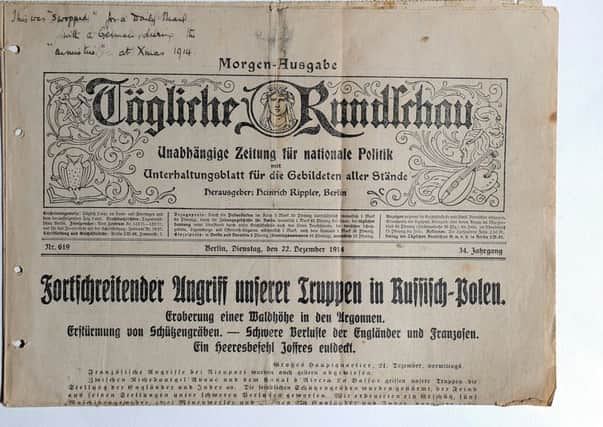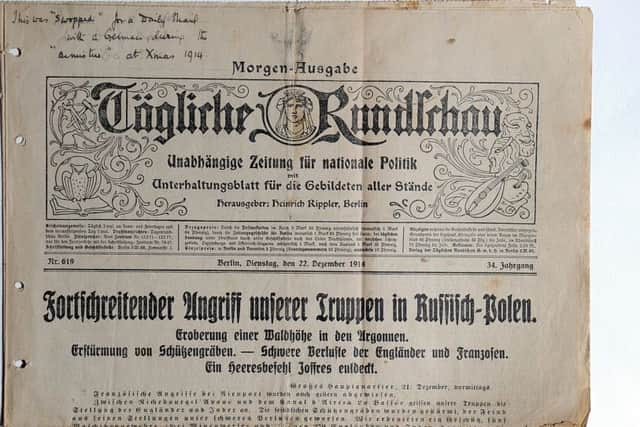Story of the Christmas truce a century on


BY December 1914 the war had been raging for four months and clearly wasn’t going to be over by Christmas, as some had predicted.
For those battle weary men at the front who were many miles from home it must have been a miserable experience. But on December 25 something remarkable happened.
Advertisement
Hide AdAdvertisement
Hide AdPrivate W Weir, of the 18th Hussars, wrote to his wife in York and described the events that unfolded. “As soon as daylight broke on Christmas Day we were saluted by the Germans, whose trenches were only 60 yards away,” he said. “They called out in good English, ‘A Happy Christmas to you all.’ We took no notice of it at first, but at about 1.30pm we heard them calling again.


“We looked out of our loop-holes, and there they were all standing on the top of their trenches. We could hardly believe our eyes. We were just about to open fire when our officers gave us the order to unload our rifles. Seeing the Germans standing there without rifles we stood up and answered them.
“Then they cheered. One of their men cried out, ‘Here are some cigars for you, come and fetch them.’ We were not having any of it at first, as we thought it might be a trap. The German then threw a small box of cigars as far as he could and again told us to come over for them. They shouted, ‘Come on, we will not fire on you.’
“The fellow who threw the cigars then came down from the top of his trench and, picking up the box again, started to walk towards us. Seeing this, I climbed over the parapet of our trench and went to meet him. When we met he handed me the cigars and said, ‘A Happy Christmas to you.’ I hardly knew what to do at first but I shook hands with him and wished him the compliments of the season, too. As soon as the Germans saw us shake hands they cheered like mad. They then started to come towards our trench.
Advertisement
Hide AdAdvertisement
Hide Ad“Our boys, all Indians by the bye, started out to meet them. To see our greatest enemy shaking hands with our Indian troops and giving them cigars and cigarettes was a sight I shall never forget. One of the Germans asked if I should like to bury a few dead Indian troops lying near their trenches.
“My chum and I set to work, and buried about a dozen of them for which the Germans thanked us. We then had our photographs taken by a German who was the proud possessor of a small camera.
“All the Germans looked very fit. One thing I noticed was that there were Iron Crosses galore amongst them. One of their officers clasped his hands and said, ‘My God, why cannot we have peace, and let us all go home.’ We spent an hour with them. One of the Germans asked if we were going back to fire on them. I said I did not know. He then said, ‘This is a Holy day. Germany keeps Christmas, and I know England does, so let’s be friends for a few hours.’
“After dark you could hear them singing and playing a melodeon. They also had Christmas trees on the top of their trenches and these were lighted by Chinese lanterns. You could also see them walking along the top of their trenches smoking cigarettes. The only British troops there were three officers, my chum, and myself. This incident occurred only in one part of the line covering a distance of about 300 yards. On our right and left they were fighting like demons.”
Advertisement
Hide AdAdvertisement
Hide AdIt’s a moving account and yet for many years after the war had finished it was questioned whether there had even been a truce at all.
However, Richard High, a senior librarian in the special collections department at the University of Leeds, says the numerous references made in soldiers’ letters and diaries, as well as in newspaper reports from the time, prove that the fighting did stop at various points along the front.
Contrary to popular belief, though, it was the Germans, not the British, who for the most part instigated the truce. “It was on Christmas Eve during the night when British soldiers first heard singing from the German trenches and saw these illuminated Christmas trees,” he says.
“Later on they saw German soldiers leaving their trenches and initially there was a bit of suspicion on the part of the British, as you’d imagine. But they climbed out of their trenches and went into No Man’s Land and met the German soldiers. They talked to them and shook hands and exchanged presents.”
Advertisement
Hide AdAdvertisement
Hide AdAmong the items swapped by the soldiers were newspapers, one of which is now housed in the Liddle Collection at Leeds University. “It comes from the collection of Major Richard Archer Houblon who was with the Royal Horse Artillery.
“He saw British and German soldiers shaking hands with each other in No Man’s Land and joined in. He talked about meeting several German soldiers, some of whom spoke very good English, and amongst other things he swapped a copy of the Daily Mail for the German newspaper we have here.”
In some instances this truce lasted for two or three days and even on to New Year’s Day before normality returned. “The high command wanted the war started again and eventually orders were sent calling for this unofficial truce to end.”
By the middle of January the festive feelings of goodwill had petered out and both sides were soon at loggerheads once again. It is perhaps wishful thinking to imagine what might have happened had sense prevailed among the leaders on both sides.
Advertisement
Hide AdAdvertisement
Hide AdBut for one tantalising moment peace did break out amid the fear and frozen squalor of the trenches. A brief flicker of light amid the encroaching darkness.